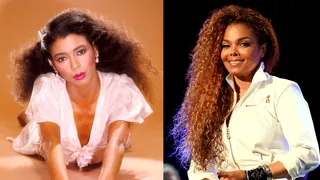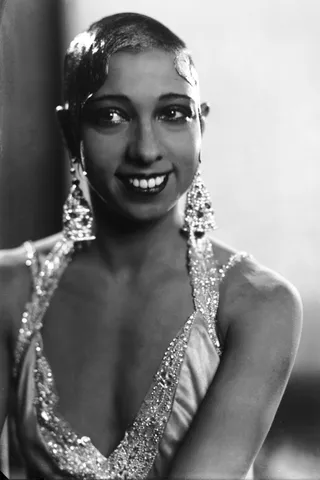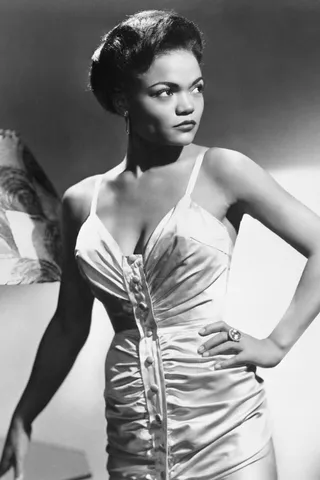The Black List - Black Women Who Were Banned By The Entertainment Industry And Fought Back
Irene Cara, Janet Jackson and more.

1 / 7
The entertainment industry may look glamorous from the outside but show business can be brutal. Speaking out against injustice, a minor wardrobe malfunction, or demanding a fair wage can hurt one's career, especially if you are a Black woman. From Janet Jackson to Irene Cara, who recently passed away, here are the women who fought back when they were banned from the entertainment industry.
Photo By Photos from left: (Photo by Harry Langdon/Getty Images), (Photo by Christopher Polk/BET/Getty Images for BET)
![Irene Cara - Musicians aren't exempt from being blacklisted either. Irene Cara, the singer of the hit song "Fame," the title track of the 1980 blockbuster film, learned the hard way. After winning $1.5 million when she sued Al Coury Inc. and Network Records of withholding her royalties from the Flashdance soundtrack, the pop singer was shut out. She said in an interview that the industry "virtually blacklisted [me]. All of a sudden, I was hearing stories about how difficult I was to work with, ridiculous rumors about drugs and what a diva I was."(Photo: Jordin Althaus/WireImage)](https://images.paramount.tech/uri/mgid:arc:imageassetref:bet.com:ae35a36b-2948-420c-a922-c588f82ed8b6?format=webp&width=320)
2 / 7
Irene Cara was a huge star in the 1970s and early 1980s for films like "Sparkle" and "Fame." However, the Oscar winner was not being paid by her label, even with an Oscar-winning song like "Flashdance...What A Feeling." In 1985, she sued Al Coury Inc. and Network Records for withholding her royalties from the "Flashdance" soundtrack. While she was banned from the music industry after the lawsuit, Cara didn't stop fighting. She eventually won the $1.5 million lawsuit against her label. However, the label filed bankruptcy. Irene Cara died at 63 years old on Nov. 25, 2022. (Photo: Jordin Althaus/WireImage)

3 / 7
Janet Jackson - Following Janet Jackson's collaborative Super Bowl Halftime show performance with Justin Timberlake in 2004, the pop royal received backlash for a wardrobe malfunction that exposed a nipple. After the incident, she was banned from MTV and many radio stations refused to play her music. Timberlake experienced little to no backlash. However, due to her undeniable talent, Jackson's career recovered. In 2018, Oscar winner Matthew A. Cherry launched "Janet Jackson Appreciation Day," which now trends during every Super Bowl. (Photo: Doug Meszler/Splash News/Corbis)

4 / 7
Legendary actress Lena Horne was shut out of Hollywood for her civil rights activism. Marked as a "Communist sympathizer," Horne was blacklisted in the 1950s because of the Red Scare and her leftist views. She found herself unable to perform on television or in movies for seven years, but due to hard work and the eventual support of anti-Communist Roy Brewer, Horne would rise again. (Photo: Ron Galella / Getty Images)

5 / 7
Vanessa Williams - In 1983, Vanessa Williams became the first Black woman crowned Miss America. However, in July 1984 nude photos surfaced of Williams. The beauty was stripped of her crown and blacklisted in the entertainment industry. After years of directors and producers refusing to hire her, Williams made a legendary comeback in the music industry with 1988's "The Right Stuff." She credited the album's success to the loyalty of the Black community and urban radio. In 2020, the Miss America organization apologized to Vanessa Williams. (Photo: Larry Busacca/Getty Images For Carmen Marc Valvo)
ADVERTISEMENT

6 / 7
Josephine Baker was an iconic dancer and performer, breaking barriers in Hollywood and abroad. However, her career in America was cut short when she was refused service at Manhattan's Stork Club in October 1951. Baker called out powerful columnist Walter Winchell, who was at the restaurant during the incident and didn't say a word. In retaliation, Winchell accused Baker of being a Communist, ruining her career and forcing her to leave the country to find work. That didn't stop Baker from fighting back against injustice. She refused to perform for segregated audiences, aided the French Resistance during World War II and was awarded the Resistance Medal by the French Committee of National Liberation. (Photo by Keystone-France/Gamma-Keystone via Getty Images)
Photo By (Photo by Keystone-France/Gamma-Keystone via Getty Images)
